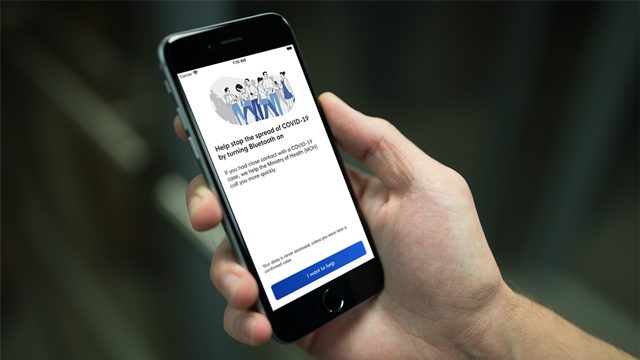SUMMARY
This is AI generated summarization, which may have errors. For context, always refer to the full article.

SINGAPORE – Did you come in close contact with a novel coronavirus patient?
Singapore developed an app, called TraceTogether, which can help its Ministry of Health (MOH) in tracing close contacts of coronavirus patients, with the users’ consent.
Singapore Foreign Minister Vivian Balakrishnan, minister-in-charge of Singapore’s Smart Nation Initiative, said on Monday, March 23, that TraceTogether will soon be open-source. This will allow other countries to also use it to fight the coronavirus.
Using Bluetooth, TraceTogether allows users to track the persons they came in close contact with, as long as the other persons are using the app. If a user tests positive for the coronavirus, he or she can then permit the MOH to access the data in TraceTogether to identify his or her close contacts.
The app was developed by Singapore’s Government Technology Agency and Ministry of Health.
The Singapore government explained on Saturday, March 21: “Using Bluetooth, TraceTogether identifies other nearby phones with the app installed. It then tracks when you are in close proximity with these other persons, including timestamps. If the need arises, this information can then be used to identify close contacts based on the proximity and duration of an encounter between the two users.”
“Once an individual is confirmed with the virus, he can choose to allow MOH to access the data in the app to help identify close contacts. While this will not replace the contact-tracing process, it is a useful addition – especially when there are problems with recall,” the government added.
TraceTogether “can identify people who have been within 2m of coronavirus patients for at least 30 minutes, using wireless Bluetooth technology,” reported The Straits Times.
Soon ‘available to the world’
Balakrishnan said TraceTogether has been installed by more than 620,000 people as of Monday. Singapore is a city-state of 5.7 million people.
Balakrishnan added that their Government Technology Agency “is now working around the clock to finalize our protocol reference documents and reference implementation, so that others may deploy their own flavors of TraceTogether – each implementing the BlueTrace protocol.
“We believe that making our code available to the world will enhance trust and collaboration in dealing with a global threat that does not respect boundaries, political systems or economies,” Singapore’s top diplomat said.
He added, “Together, we can make our world safer for everyone.” (READ: Why Singapore reopened schools despite coronavirus: They used science)
Singapore has earned praise worldwide for the success of its contact-tracing methods.
As of Monday, only 31 out of its 215 local coronavirus cases remain “unlinked,” according to its MOH. These means only these 31 cases cannot be traced to previous cases of the coronavirus, or to travel histories in affected countries.
The rest of Singapore’s 509 coronavirus cases are imported from other countries, including the Philippines. Singapore has 294 imported coronavirus cases as of Monday, making up 57% of the total.
Singapore Prime Minister Lee Hsien Loong, in an interview with The Australian newspaper on Friday, March 20, said they in the Singapore government “have contact-traced several thousand people already.”
“We work very hard to contact-trace,” Lee said. “Who are the people you have met within the last two weeks, where have you been, what have you done, who may have been exposed to you?”
Despite Singapore’s efforts, however, Lee said they “are under no illusions that the problem is over at all.”
“We are watching very carefully to see where water may leak in, and if you take your eyes off it for a moment, suddenly I have an outbreak, like what happened in South Korea, and I will be in a perilous situation,” Lee added. – Rappler.com
Add a comment
How does this make you feel?
There are no comments yet. Add your comment to start the conversation.